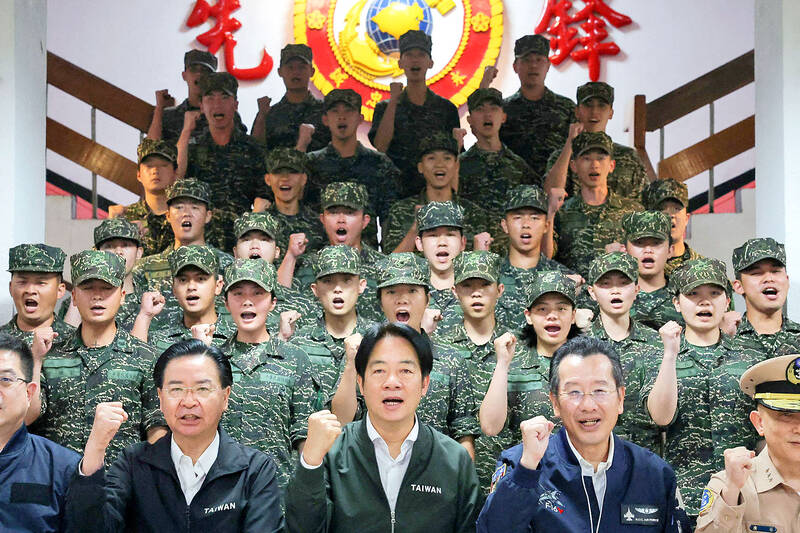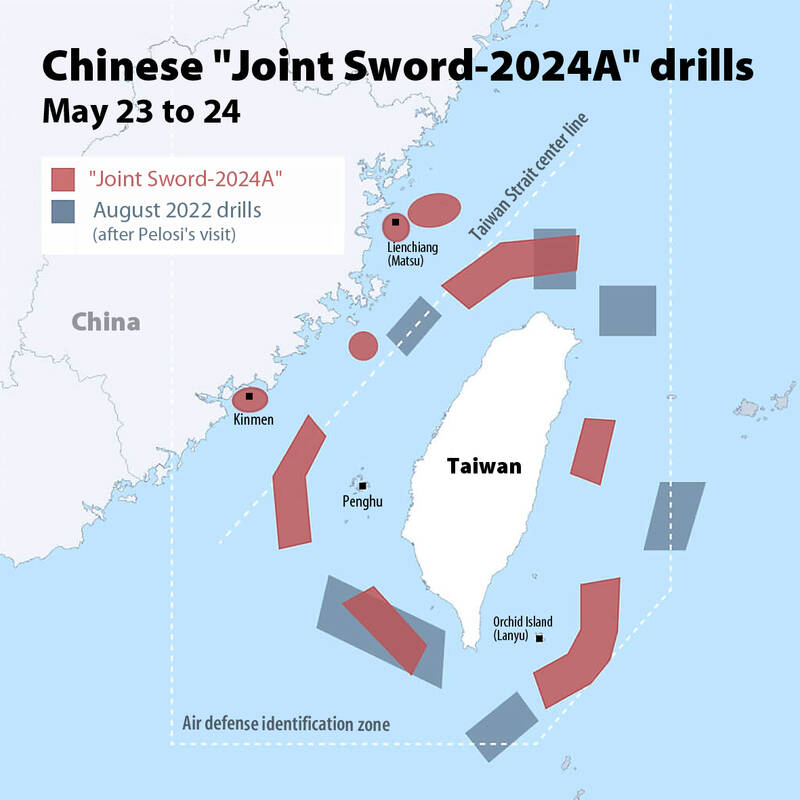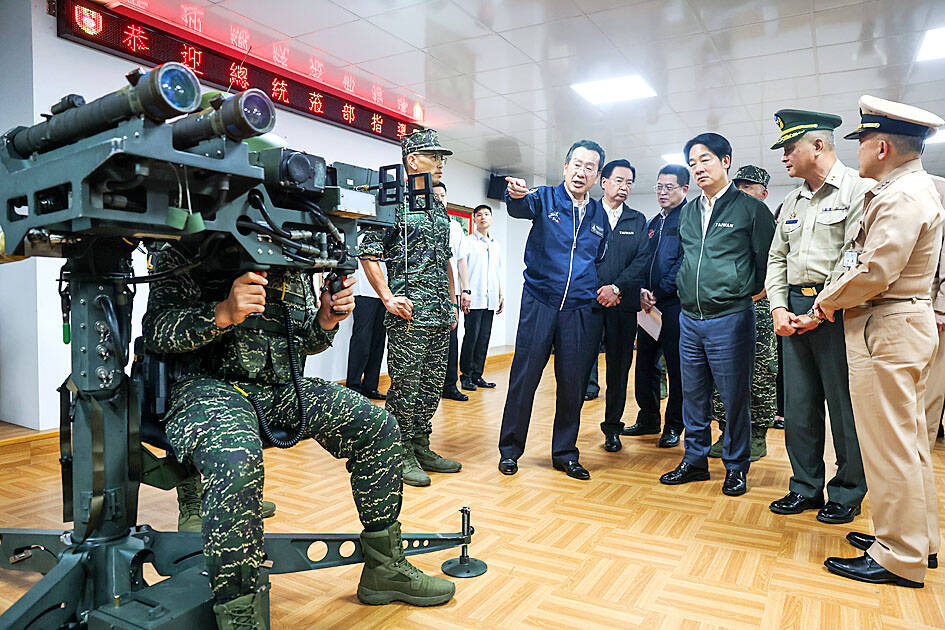President William Lai (賴清德) yesterday vowed to defend Taiwan’s freedom while preserving peace in the region, as Beijing began two days of drills around Taiwan as “punishment” for “separatist acts.”
As of 2pm, China had dispatched 15 combat ships, 16 coast guard ships, and 42 fighter jets and early warning aircraft during the first day of its “Joint Sword-2024A” exercises around Taiwan, the Ministry of National Defense told a news conference.
The exercises were launched by China’s People’s Liberation Army (PLA) Eastern Theater Command soon after it made an announcement at 7:45am yesterday, said Major General Huang Wen-chi (黃文?), assistant deputy chief of staff for intelligence.

Photo: Ann Wang, Reuters
Of the Chinese coast guard ships, four were detected off the east coast of Taiwan, three were off the southeast coast and nine were in waters near Kinmen and Lienchiang (Matsu) counties, he said.
Twenty-eight of the 42 aircraft entered the nation’s response zone, Huang said.
“Unlike China’s previous military exercises around Taiwan, it did not give precise longitudes and latitudes in which military exercises would be held, nor did it announce no-fly zones,” he said.

Source: CNA
PLA aircraft and vessels did not enter the nation’s contiguous zone, which is 24 nautical miles (44km) off Taiwan proper, Huang said, adding that no live-fire exercises were detected.
Major General Tung Chih-hsing (董冀星), head of the ministry’s joint combat planning department, said that Chief of the General Staff Admiral Mei Chia-shu (梅家樹) presided over a combat readiness guidance meeting and gave two key instructions to the military.
“First, the military was asked to step up its intelligence-gathering and reconnaissance efforts, and elevate response command and control at all levels. Second, all levels of the military must handle the situation using crisis management procedures and maintain normal combat readiness tasks and reconnaissance drills,” Tung said.

Photo: CNA
Major General Lou Woei-jye (樓偉傑), director of the Political Warfare Bureau’s Cultural and Psychological Warfare Section, said that the military has produced short films to counter Chinese cognitive warfare tactics, to be aired on social media and in foreign embassies.
During a visit to a military base in Taoyuan, Lai said he would “stand on the front line ... to jointly defend national security.”
“At this moment the international community is paying a lot of attention to democratic Taiwan,” the president said in a speech that did not directly mention the drills.

Photo: Yasuyoshi Chiba, AFP
“Faced with external challenges and threats, we will continue to defend the values of freedom and democracy, and safeguard peace and stability in the region,” he said.
Deputy Minister of National Defense Po Horng-huei (柏鴻輝) told a news conference after a Cabinet meeting earlier in the day that the ministry had earlier seen signs showing Beijing would conduct military exercises.
“Our recent observations showed that the way that the Chinese military deployed around the Taiwan Strait pointed to a potential joint military exercise,” Po said, adding that all information is within the scope of the ministry’s intelligence, surveillance and reconnaissance operation.
The Coast Guard Administration said that it dispatched seven ships and 16 boats to help dispel Chinese coast guard ships off the north and east coasts.
Presidential Office spokesperson Kuo Ya-hui (郭雅慧) said that there is strong international consensus for maintaining peace and stability across the Taiwan Strait and in the Indo-Pacific region.
“However, it is regrettable to see China unilaterally conducting provocative military exercises, as these exercises threaten not only freedom and democracy in Taiwan, but also the status quo of peace and stability in the region,” Kuo said.
“The Presidential Office has held the consistent position that maintaining peace and stability is a shared responsibility and goal for both sides of the Taiwan Strait. Our national security team and all military units have a full grasp of the military situation. In the face of external challenges and threats, we will continue to protect our democracy and the public may rest assured that we are confident and capable of safeguarding our national security,” she added.
China’s military said the drills would serve as “strong punishment for the separatist acts of ‘Taiwan independence’ forces.”
Chinese Ministry of Foreign Affairs spokesman Wang Wenbin (汪文斌) adopted language commonly used by China’s propaganda outlets.
“Taiwan independence forces will be left with their heads broken and blood flowing after colliding against the great ... trend of China achieving complete unification,” Wang told reporters.
Additional reporting by AFP

SECURITY: As China is ‘reshaping’ Hong Kong’s population, Taiwan must raise the eligibility threshold for applications from Hong Kongers, Chiu Chui-cheng said When Hong Kong and Macau citizens apply for residency in Taiwan, it would be under a new category that includes a “national security observation period,” Mainland Affairs Council (MAC) Minister Chiu Chui-cheng (邱垂正) said yesterday. President William Lai (賴清德) on March 13 announced 17 strategies to counter China’s aggression toward Taiwan, including incorporating national security considerations into the review process for residency applications from Hong Kong and Macau citizens. The situation in Hong Kong is constantly changing, Chiu said to media yesterday on the sidelines of the Taipei Technology Run hosted by the Taipei Neihu Technology Park Development Association. With

CARROT AND STICK: While unrelenting in its military threats, China attracted nearly 40,000 Taiwanese to over 400 business events last year Nearly 40,000 Taiwanese last year joined industry events in China, such as conferences and trade fairs, supported by the Chinese government, a study showed yesterday, as Beijing ramps up a charm offensive toward Taipei alongside military pressure. China has long taken a carrot-and-stick approach to Taiwan, threatening it with the prospect of military action while reaching out to those it believes are amenable to Beijing’s point of view. Taiwanese security officials are wary of what they see as Beijing’s influence campaigns to sway public opinion after Taipei and Beijing gradually resumed travel links halted by the COVID-19 pandemic, but the scale of

A US Marine Corps regiment equipped with Naval Strike Missiles (NSM) is set to participate in the upcoming Balikatan 25 exercise in the Luzon Strait, marking the system’s first-ever deployment in the Philippines. US and Philippine officials have separately confirmed that the Navy Marine Expeditionary Ship Interdiction System (NMESIS) — the mobile launch platform for the Naval Strike Missile — would take part in the joint exercise. The missiles are being deployed to “a strategic first island chain chokepoint” in the waters between Taiwan proper and the Philippines, US-based Naval News reported. “The Luzon Strait and Bashi Channel represent a critical access

Pope Francis is be laid to rest on Saturday after lying in state for three days in St Peter’s Basilica, where the faithful are expected to flock to pay their respects to history’s first Latin American pontiff. The cardinals met yesterday in the Vatican’s synod hall to chart the next steps before a conclave begins to choose Francis’ successor, as condolences poured in from around the world. According to current norms, the conclave must begin between May 5 and 10. The cardinals set the funeral for Saturday at 10am in St Peter’s Square, to be celebrated by the dean of the College